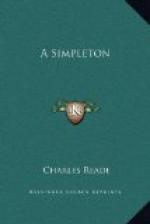Nevertheless, the presiding physician discovered in him a certain progress of intelligence, which gave him great hopes. In the fifth month, having shown a marked interest in the other sick patients, coupled with a disposition to be careful and attentive, they made him a nurse, or rather a sub-nurse under the special orders of a responsible nurse. I really believe it was done at first to avoid the alternative of sending him adrift, or transferring him to the insane ward of the hospital. In this congenial pursuit he showed such watchfulness and skill, that by and by they found they had got a treasure. Two months after that he began to talk about medicine, and astonished them still more. He became the puzzle of the establishment. The doctor and surgeon would converse with him, and try and lead him to his past life; but when it came to that, he used to put his hands to his head with a face of great distress, and it was clear some impassable barrier lay between his growing intelligence and the past events of his life. Indeed, on one occasion, he said to his kind friend the doctor, “The past!—a black wall! a black wall!”
Ten months after his admission he was promoted to be an attendant, with a salary.
He put by every shilling of it; for he said, “A voice from the dark past tells me money is everything in this world.”
A discussion was held by the authorities as to whether he should be informed he had money and jewels at the bank or not.
Upon the whole, it was thought advisable to postpone this information, lest he should throw it away; but they told him he had been picked up at sea, and both money and jewels found on him; they were in safe hands, only the person was away for the time. Still, he was not to look upon himself as either friendless or moneyless.
At this communication he showed an almost childish delight, that confirmed the doctor in his opinion he was acting prudently, and for the real benefit of an amiable and afflicted person, not yet to be trusted with money and jewels.
CHAPTER XVII.
In his quality of attendant on the sick, Staines sometimes conducted a weak but convalescent patient into the open air; and he was always pleased to do this, for the air of the Cape carries health and vigor on its wings. He had seen its fine recreative properties, and he divined, somehow, that the minds of convalescents ought to be amused, and so he often begged the doctor to let him take a convalescent abroad. Sooner than not, he would draw the patient several miles in a Bath chair. He rather liked this; for he was a Hercules, and had no egotism or false pride where the sick were concerned.
Now, these open-air walks exerted a beneficial influence on his own darkened mind. It is one thing to struggle from idea to idea; it is another when material objects mingle with the retrospect; they seem to supply stepping-stones in the gradual resuscitation of memory and reason.




